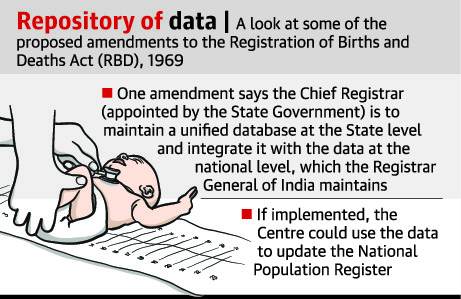
Recently, the Ministry of Home Affairs (MHA) proposed a Bill to amend the RBD Act, 1969, which is anticipated to be introduced during the upcoming winter session of the parliament.
Need
- Centralized Database: The changes recommended aim to consolidate all databases onto a single platform.
- Helpful for creating the NPR and NRC: If the changes are put into effect, the Center could use the information to update the National Population Register (NPR), which was created in 2010 and updated in 2015 via door-to-door enumeration.
- The NPR is the first stage toward the construction of a National Register of Citizens (NRC), and it now contains a database of 119 crore inhabitants.
Key Provisions of the draft Bill
Birth Certificates
- The Central government is recommending that birth certificates become a requirement for employment with the Central and State governments, inclusion on voter lists, issuance of driving licences and passports, and entrance into educational institutions.
Data storage and linking to electoral rolls
- When someone turns 18 or passes away, the centrally stored data will be updated in real time without the need for a human interface, resulting in addition and deletion from the electoral roll, respectively.
Death certificates
- • In addition to the relative of the deceased, hospitals and medical facilities must give the local registrar a copy of all death certificates that list the cause of death.
Registration mandatory
- Despite the fact that the RBD Act of 1969 already makes birth and death registration mandatory and that breaking this law is criminal, By making registration necessary to access essential services like school entrance and marriage registration, the government hopes to increase compliance.
Significant Features of the Registration of Births and Deaths Act, 1969
- Births include both live births and stillbirths, and there is a uniform law requiring the reporting and registration of all births and deaths that take place within the nation [Section 1 (2)].
- Specifies the roles and responsibilities of officials at the federal, state, local, and district levels in implementing the Act’s provisions [Sections 3, 4, 6 and 7].
- The Registrar must record birth and death occurrences at the location of the occurrence and within her or his jurisdiction [Section 7(2)].
